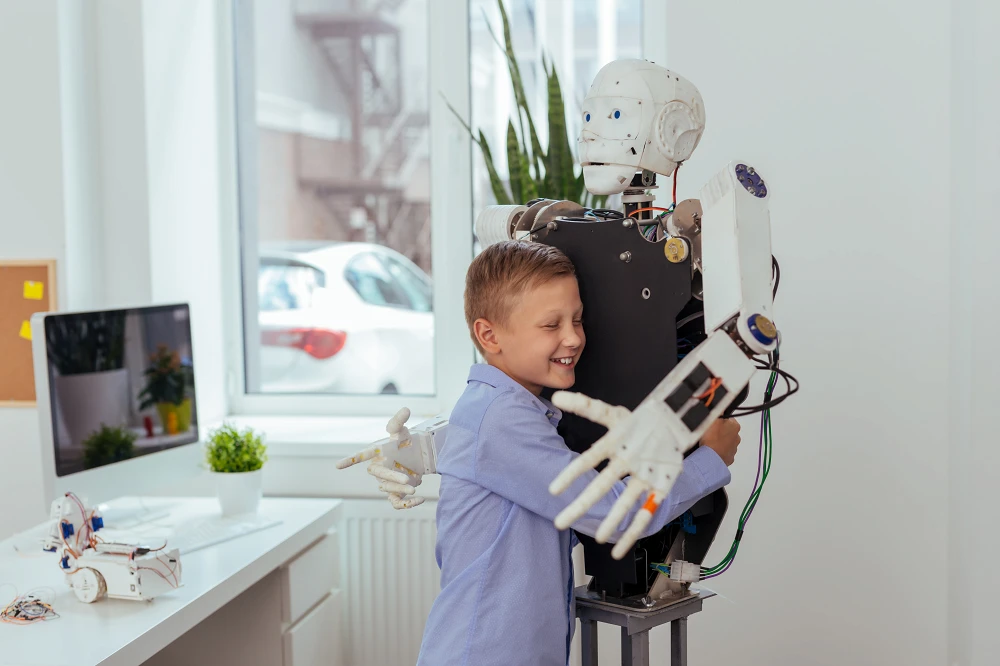Robots, empathy and emotions

The idea of a life-like robot as a member of the family is nothing new – there have been films, TV shows and books on the topic for decades. But what was long situated in the realm of science fiction is now becoming reality. Robots of today have the shape of humans and animals, they are entertaining and ‘cute’, and they are gaining access to our schools, hospitals, homes and even our beds. Thanks to artificial intelligence, robots are capable of analysing our mood and feelings, and they can react accordingly.
Focus of the study
When robots have human characteristics, we begin to see them as ‘trustworthy’. Nevertheless, they are and remain machines, and their seemingly empathetic nature is, at least today, nothing more than clever programming. But what influence do robots actually have in our society and on the people who interact with them? Are robots perhaps even more spy than confidante? Who is behind the façade? And who benefits more: users or manufacturers who process the data collected? And what do we expect from these machines – or better: what should we expect from them? Numerous sociological, psychological, economic, philosophical and legal questions connected to current and future use and the potential of robots remain unresolved. This TA study seeks answers.
Links and downloads
Video
Organisation
Project duration
July 2019 to February 2021
Project leaders
- Professor Hartmut Schulze, School of Applied Psychology, University of Applied Sciences and Arts Northwestern Switzerland / FHNW
- Professor Oliver Bendel, School of Business, University of Applied Sciences and Arts Northwestern Switzerland / FHNW
- Professor Maria Schubert, School of Health Professions
Institute of Nursing, Zurich University of Applied Sciences / ZHAW
Supervisory group
- David Altwegg, économe et ingénieur, membre du Comité Directeur TA-SWISS, président du groupe d’accompagnement
- Huma Khamis, journaliste scientifique RTS, membre du Comité Directeur TA-SWISS
- Dr. Jean Hennebert, Département d’informatique Uni Fribourg, membre du Comité Directeur TA-SWISS
- Prof. Dr. Lorenz Hilty, Département d'informatique de l'Université de Zurich et Département de technologie et société de l'Empa, membre du Comité Directeur TA-SWISS
- Prof. Dr. Maya Zumstein-Shaha , Commission nationale d'éthique pour la médecine humaine CNE, Invitée du Comité Directeur TA-SWISS
- Prof. Dr. Giatgen Spinas, Hôpital universitaire de Zurich, membre du Comité Directeur TA-SWISS
- Prof. David Rudrauf, Laboratoire de modélisation multimodale de l’émotion et du ressenti, Université de Genève
- Prof. Dr. Nadia Magnenat, Domaine de recherche : Virtual Humans and Social Robots, MIRAlab
- Maitre Nicolas Capt, Membre du barreau, spécialiste du droit des nouvelles technologies
- Dr. Daniela Cerqui, anthropologue, Université de Lausanne
- Dr. Wafa Johal, Computer-Human Interaction in Learning and Instruction, EPFL
- Prof. Dr. Pierre Dillenbourg, Computer-Human Interaction in Learning and Instruction, EPFL
- Lisa Schurrer, Member of Robotics and Philosophy project, ETHZ
- Dr. Patricia Jungo, Coordinatrice des coopérations de recherche, Curaviva
- PD Dr. Rouven Porz, Privat Dozent in Klinische Ethik, Inselspital Bern
- Catherine Lennman, Députée aux affaires internationales, PFPDT
- Marc Atallah, Directeur de la Maison d’ailleurs, Maitre d’enseignement philosophie de la technique
- Prof. Dr. Marcel Weber, Professeur Philosophie des sciences, Université de Genève
- Johannes Stähli, CEO raumCode GmbH
- Dr. Jasmine Truong, PostDoc Sozial- und Kulturgeographie, Uni Bern
- Vanessa Rampton, éthique de la robotique, ETH historian of idea, ETHZ
Contact
Eliane Gonçalves, TA-SWISS
eliane.goncalves@ta-swiss.ch